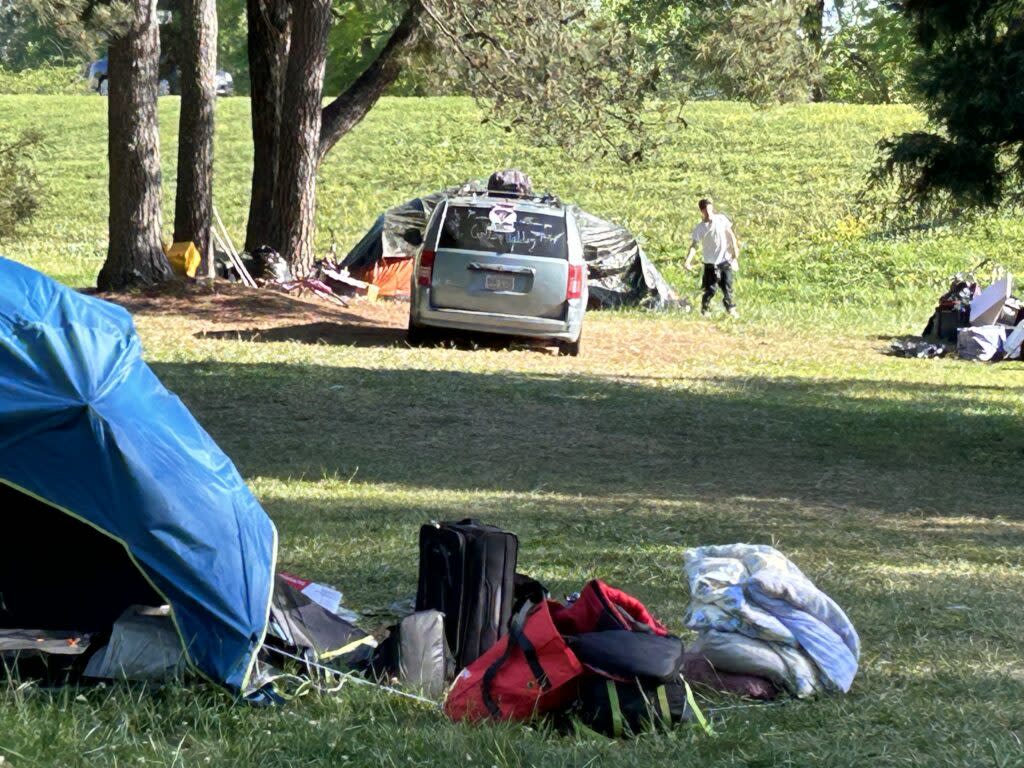Civil rights advocate says new strategies are needed to protect people experiencing homelessness

People experiencing homelessness were recently forced to move from an encampment off of U.S. 70 near Garner. (Photo: Greg Childress)
The U.S. Supreme Court’s decision to side with a local ordinance in Grants Pass, Oregon that bans homeless people from sleeping outdoors shouldn’t prompt local governments to adopt such laws, said Dan Siegel, deputy legal director of ACLU North Carolina.
Siegel and other advocates for people experiencing homelessness argue that the ordinance is unconstitutional because it punishes unhoused people who sleep outside that have no other place to go. Grants Pass officials and others who support such measures contend they are not unconstitutional if everyone must follow them.
During the North Carolina Housing Coalition’s weekly Housing Call on Tuesday, Siegel said that it’s important to focus on what the court didn’t say.
“First of all, the Court did not say that states and towns and cities have to criminalize people being homeless and sleeping outside at night,” Siegel said. “It didn’t say that if there is this kind of ordinance on the books, that it has to be enforced.”
Local governments still have discretion, Siegel said, to “adopt ordinances that they think are appropriate and to enforce or not enforce ordinances that are already on the books.”
What the Court’s decision did do, Siegel said, is erode Eighth Amendment protections for people experiencing homelessness. The amendment forbids excessive bail, fines and cruel and unusual punishments.
“It’s true that for many years the Eighth Amendment has provided an important protection for unhoused people and now that protection is gone, at least in this particular context,” Siegel said.
The Fourteenth Amendment granting citizens the right to due process as well as certain state laws and local ordinances might also provide a layer of protection against such ordinances, Siegel said.
“If those are litigated and brought before a court, those might protect people from being criminalized under these kinds of ordinances,” Siegel said. “Right now, we don’t really know. This is a conservative Supreme Court. They are not terribly friendly to civil rights, other than gun rights and religious freedom rights.”
Advocates for people experiencing homelessness will have to find “another way” to protect them from ordinances that criminalize people for being unhoused, Siegel said.
“There is still a lot of room to make progress in advocating for homeless people and working to solve this issue — both in terms of fighting in court and advocating in legislatures, especially what local governments can do,” Siegel said.
Last week, after the court’s opinion was published, Stephanie Watkins-Cruz, director of housing policy at the North Carolina Housing Coalition, expressed disappointment at the ruling.
“It was a chance for the highest court in the land to take a stand on protecting people who have nowhere else to go because of policy failures and it was a chance to treat housing like a human right by protecting and acknowledging that there is not enough housing and that there are more permanent and effective ways to solve homelessness,” Watkins-Cruz said.
In North Carolina, Charlotte recently adopted an ordinance that critics say disproportionately affects people experiencing homelessness. The law makes sleeping on benches, public defecation, panhandling, public drinking, public masturbation and trespassing offenses that can lead to arrest. These were previously ticketed offenses.
In a column published by NC Newsline, Latonya Agard, executive director of North Carolina Coalition to End Homelessness, said Grants Pass leaders could have found a more humane solution to address that town’s homeless crisis.
“Grants Pass’s refusal to find a humane solution to the humanitarian crisis in their community reveals the moral decay at the heart of this case,” Agard wrote. “The Supreme Court decision gave them, and every other city ready to punish people for experiencing homelessness, the easy way out.”
The post Civil rights advocate says new strategies are needed to protect people experiencing homelessness appeared first on NC Newsline.



